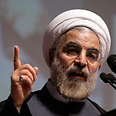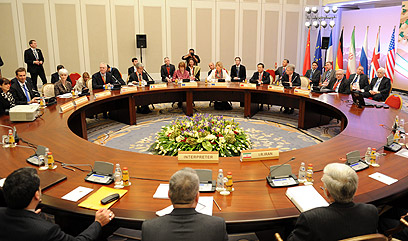
Iran has played down the impact of US sanctions that came into effect this week, but said the measures would complicate a resolution to the dispute over its nuclear program.
The new sanctions, which came into effect on Monday, target trade with Iran's shipping and automobile sectors, gold sales to Iran and handling of the Iranian currency, the rial - a further attempt to force Tehran to curb its nuclear activities.
Related stories:
- Netanyahu warns of Rohani's 'talk and enrich' doctrine
- Bahrain: Iran can help ease Syrian civil war
- Rohani in 1986: West too soft on Khomeini
In recent years, Iran has vigorously pursued its development of nuclear technology which Western countries suspect is masking its attempts to develop a weapons capability, allegations Iranian officials have repeatedly denied.
"We have no doubt that sanctions are a broken policy and we are surprised about why the American government and other governments who take part in these sanctions continually repeat a mistaken and failed policy," the state television website quoted Foreign Ministry spokesman Abbas Araqchi as saying late on Monday.
"Removing sanctions would count as a confidence-building measure and can assist in a resolution of the issue but increasing sanctions would have no result, apart from making the issue more complex and harder to resolve," he said.
Hopes for a resolution to the nuclear dispute were boosted last month with the election as president of Hassan Rohani, a former nuclear negotiator who promises a softer approach to foreign relations than hardline incumbent Mahmoud Ahmadinejad.
Analysts say it remains uncertain whether Iran with Rohani as president will be more amenable to the demands of world powers that it halt its most sensitive enrichment, to a fissile concentration of 20 percent, and stop work at Fordow, an underground nuclear facility where uranium is enriched.
Supreme Leader Ayatollah Ali Khamenei has the last word on all the big decisions in Iran, especially on the nuclear issue.
Last week the head of Iran's atomic energy organization, Fereydoun Abbasi-Davani, said there would be no change in Iran's production of enriched uranium to produce fuel.
But in an interview with Iran's state news agency on Tuesday, the organization's former head Gholam Reza Aghazadeh said that Iran's nuclear issue was "in the 90th minute" and that both Western countries and Iran needed to enter serious talks.
With Rohani not taking office until early August, analysts say any further nuclear talks between Iran and the P5+1 group of nations - the United States, Russia, China, Britain, France and Germany - are likely to be held before September.
- Receive Ynetnews updates
directly to your desktop
















